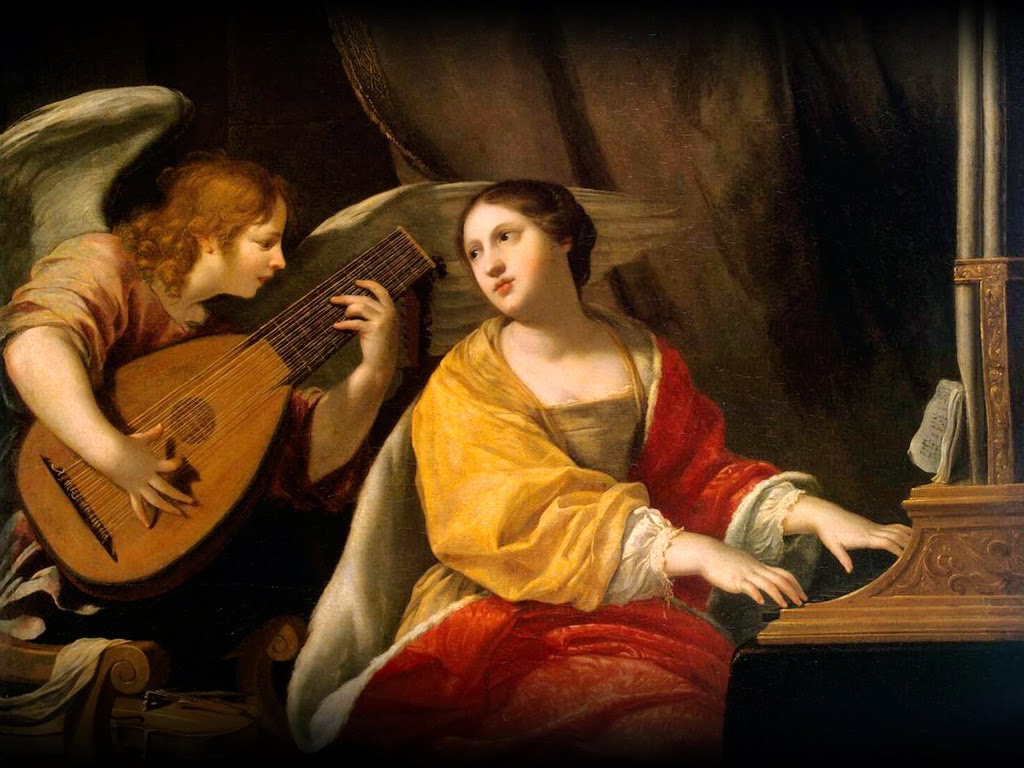about:
- born: 2nd century A.D., Rome
- died: 3rd A.D., Sicily
- virgin, Roman martyr
- major shrine: Santa Cecilia in Trastevere, Rome
- attributes: flute, organ, roses, violin, harp, harpsichord, singing
- patroness of: church music, musicians
- Her feast day is celebrated in the Roman Catholic, Anglican, Eastern Orthodox, and Eastern Catholic Churches on November 22
- Her feast has been celebrated since about the fourth century.
- She is one of seven women, excluding the Blessed Virgin, commemorated by name in the Canon of the Mass.
- According to legend, Cecilia was a young Christian of high rank betrothed to a Roman named Valerian. Through her influence Valerian was converted, and was martyred along with his brother. The legend about Cecilia’s death says that after being struck three times on the neck with a sword, she lived for three days, and asked the pope to convert her home into a church.
Since the time of the Renaissance she has usually been portrayed with a viola or a small organ.
- Cecilia is frequently depicted playing a viola, a small organ, or other musical instrument, evidently to express what was often attributed to her viz., that while the musicians played at her nuptials she sang in her heart to God.
------------
PRAYER TO SAINT CECILIA
source: https://www.ewtn.com/Devotionals/prayers/StCecilia.htm
Dear Saint Cecilia, one thing we know for certain about you is that you became a heroic martyr in fidelity to your divine Bridegroom.
We do not know that you were a musician but we are told that you heard Angels sing.
Inspire musicians to gladden the hearts of people by filling the air with God's gift of music and reminding them of the divine Musician who created all beauty.
Amen.
------------
quote:
“Liturgical action is given a more noble form when sacred rites are solemnized in song, with the assistance of sacred ministers and the active participation of the people.... Choirs must be diligently promoted, but bishops and other pastors must ensure that, whenever the sacred action is to be celebrated with song, the whole body of the faithful may be able to contribute that active participation which is rightfully theirs.... Gregorian chant, other things being equal, should be given pride of place in liturgical services. But other kinds of sacred music, especially polyphony, are by no means excluded.... Religious singing by the people is to be skillfully fostered, so that in devotions and sacred exercises, as also during liturgical services, the voices of the faithful may ring out”
(Vatican II, Constitution on the Liturgy, 112-118).
links/ sources:
- "Saint Cecilia" (source: Wikipedia):
http://en.wikipedia.org/wiki/Saint_Cecilia
- "St. Cecilia" (source: Catholic Online):
http://www.catholic.org/saints/saint.php?saint_id=34
- "St. Cecilia" (source: Catholic Encyclopedia):
http://www.newadvent.org/cathen/03471b.htm
- "St. Cecilia" (source: American Catholic):
http://www.americancatholic.org/features/saints/saint.aspx?id=1207
- "St. Cecilia" (source: EWTN):
http://www.ewtn.com/library/mary/scecilia.htm
http://www.ewtn.com/library/mary/cecilia.htm


